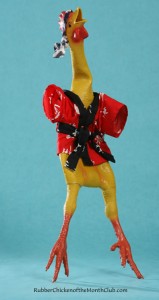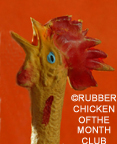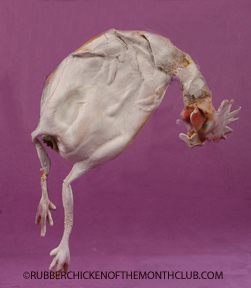Frequently Asked Questions
Q. Where do Rubber Chickens come from?

A. The origin of the rubber chicken is shrouded in mystery.
Although it’s probably safe to say that the rubber chicken DID come before the rubber egg, little more is known. There are no US patents for it. Even the Smithsonian owns up to having no clue as to this bird’s beginning. (That they also owned up to “no interest” is the subject for another post.)
Elderly comedians often credit the legendary British Clown Joseph Grimaldi, inventor of the art of prop humor in the 1800’s.
HOWEVER, since the latex injection technology, so necessary to the birth process of a rubber chicken was not invented until after WWII, it’s probably safe to write off the speculations about Grimaldi, as well as the other theory that rubber chickens were tied to muskets in the French Revolution . . .
Probably the closest to the truth is to credit the birth of this remarkable fowl to the Loftus Novelty company which, in 1939, produced a rubber chicken most looking like those we see today. NOTE: Under the more sophisticated name, Loftus International, the company still produces rubber chickens.
Q. Are all Rubber Chickens alike?

A. Certainly not!
Aside from differences in size, there are tremendous differences in quality. Some are strong, stoic creatures, who delight in womping things. Others are softer, floppier, with much finer features. The latter group are best for office mascot and dress up duty. Some are crudely drawn, stiff, vapid faced creatures. Some have only a red blotch for an eye while others have eye lids and sockets. Most have closed eyes and some of the older ones have a trickle of blood running down their necks from where, were they alive, the fatal blow would have been struck. (NOTE: For the most part, even the components of rubber chickens have never been alive.)

Q. What do Rubber Chickens have in common?
A. Lots.
1. They are all naked
2. They all have open beaks
3. They all have an extended neck and legs
4. They are all hollow
5. They all want to serve
Q. Do Rubber Chickens die?
A. Sadly, yes.
When exposed to the toxic environment found in some offices, the more sensitive chickens, such as the one below, can actually disintegrate.

A good rubber chicken can last for years, especially if it is well cared for and frequently cooped up (for the most part chickens enjoy being cooped up) in a box or file cabinet. Leave them out only in upbeat, positive settings where their natural inclination to bring laughter while reducing stress can be most appreciated.




Comments on this entry are closed.